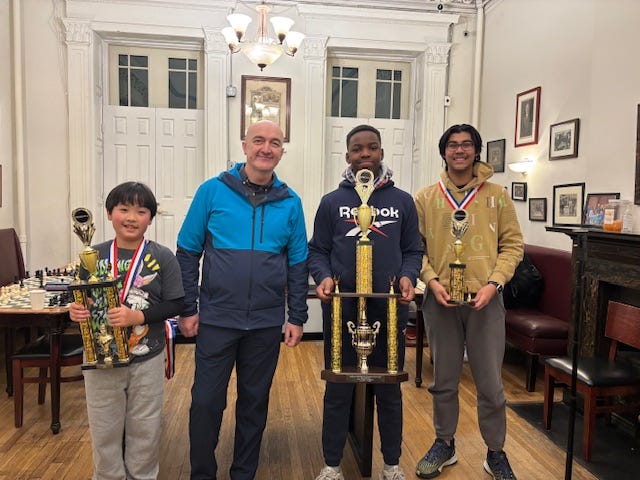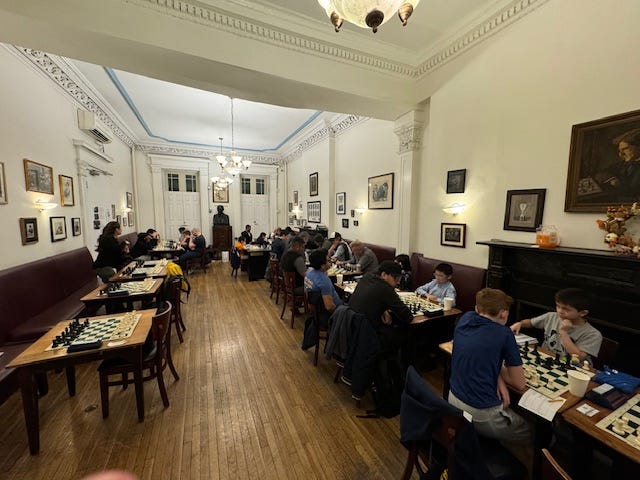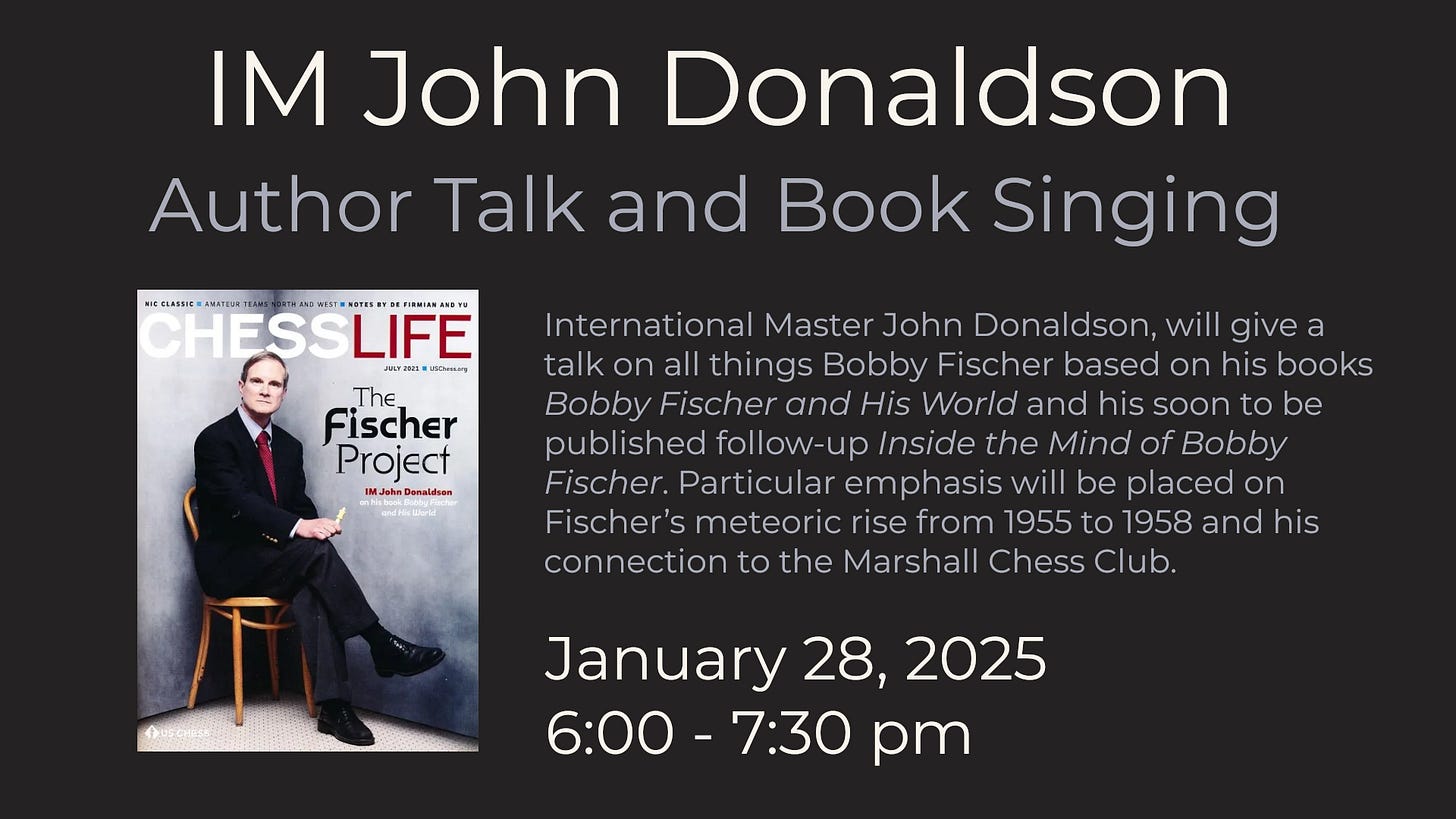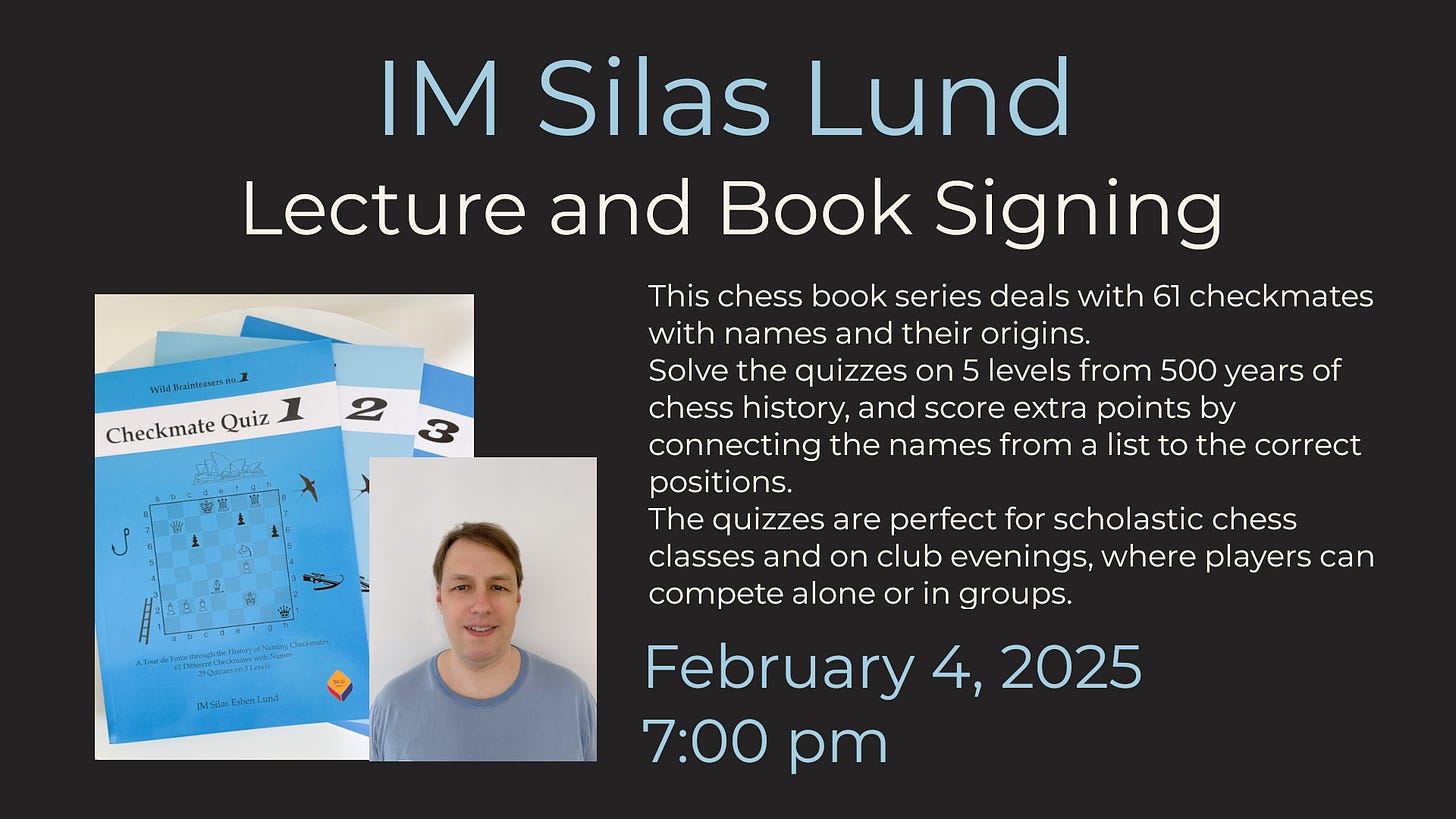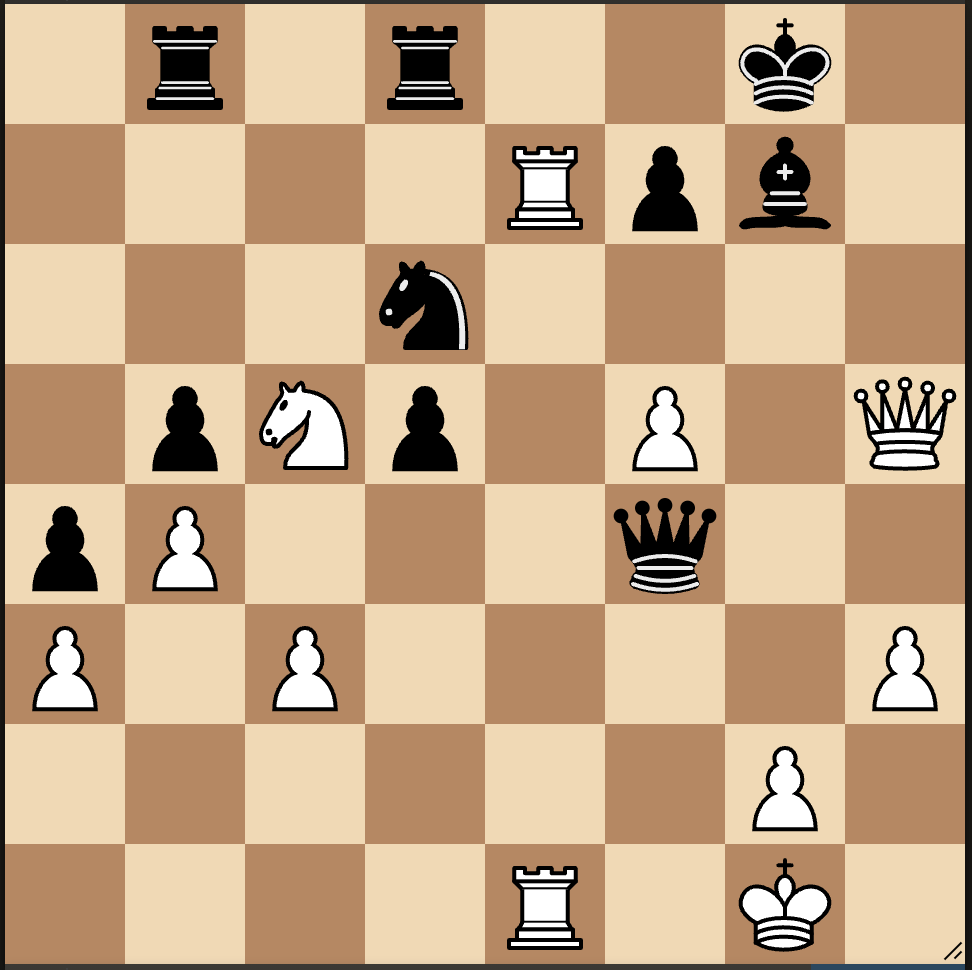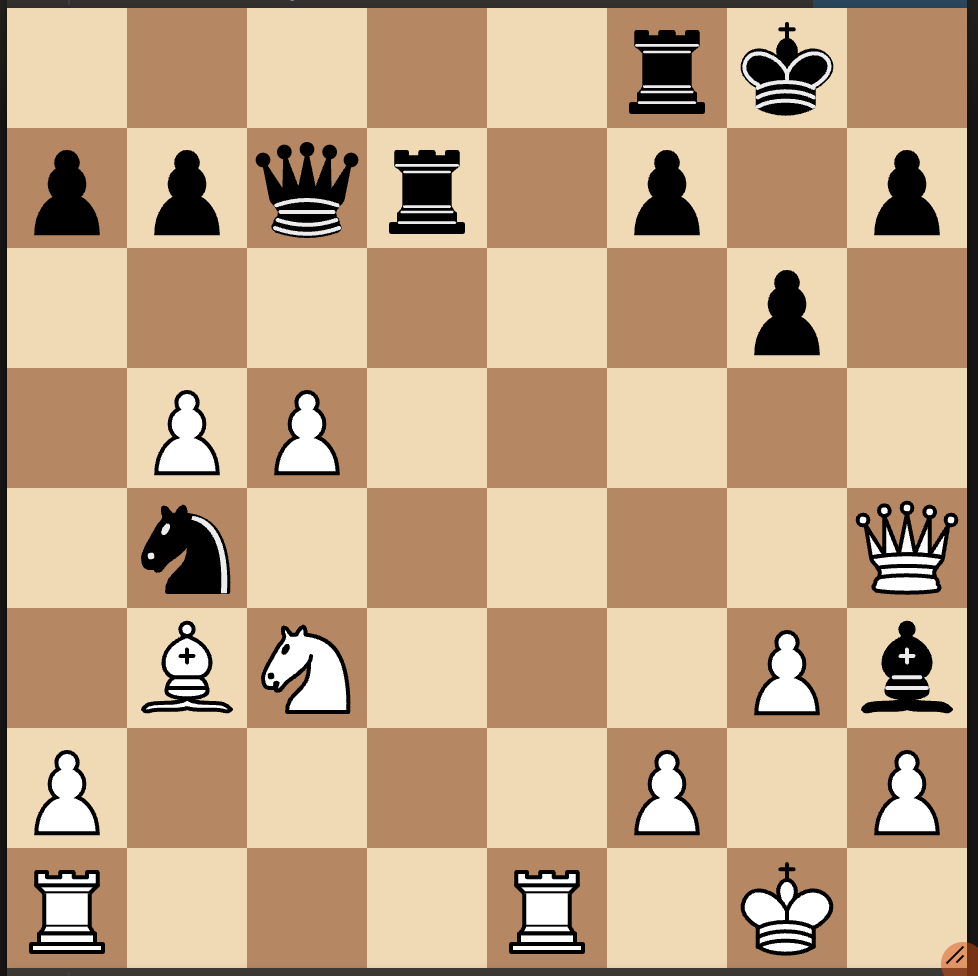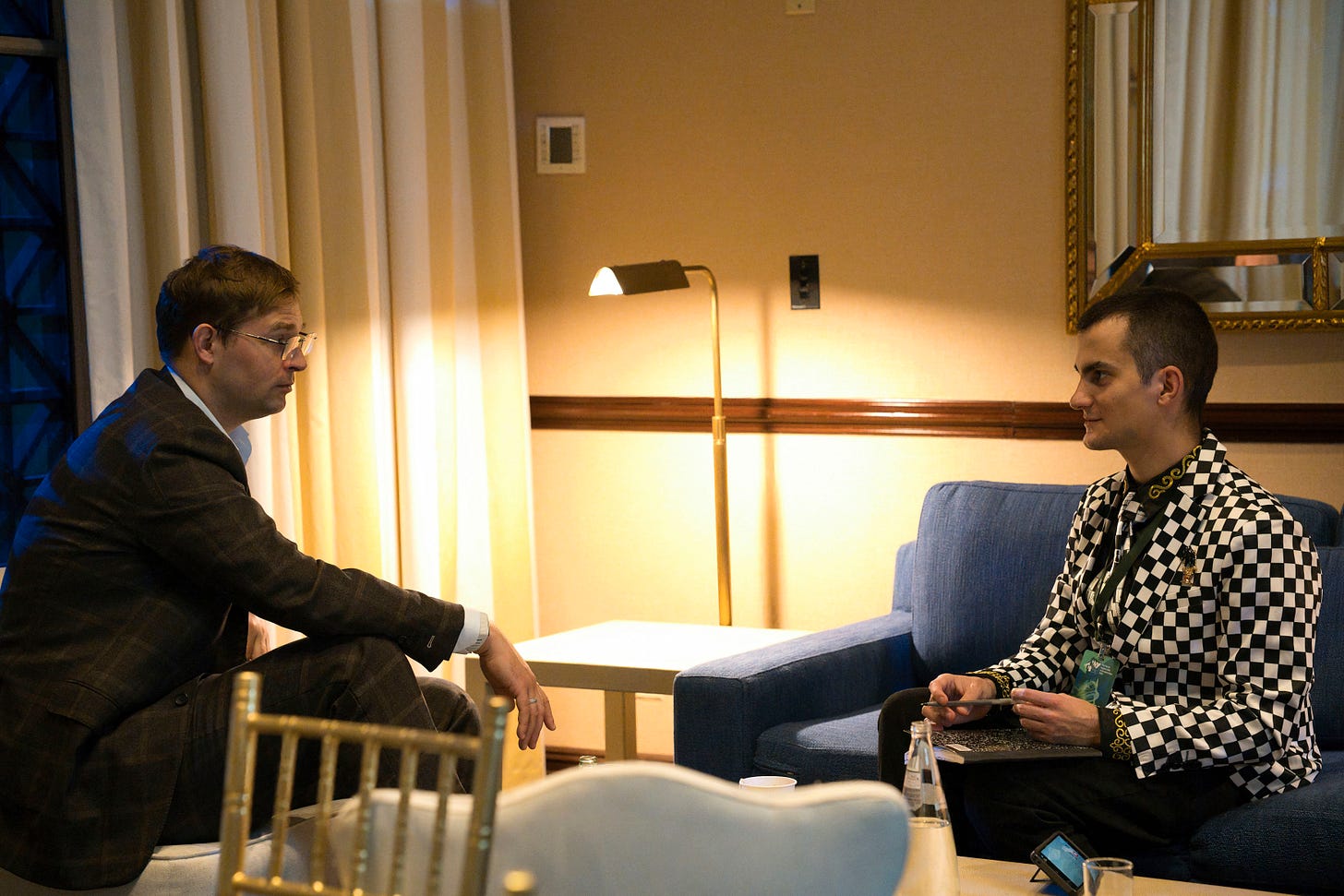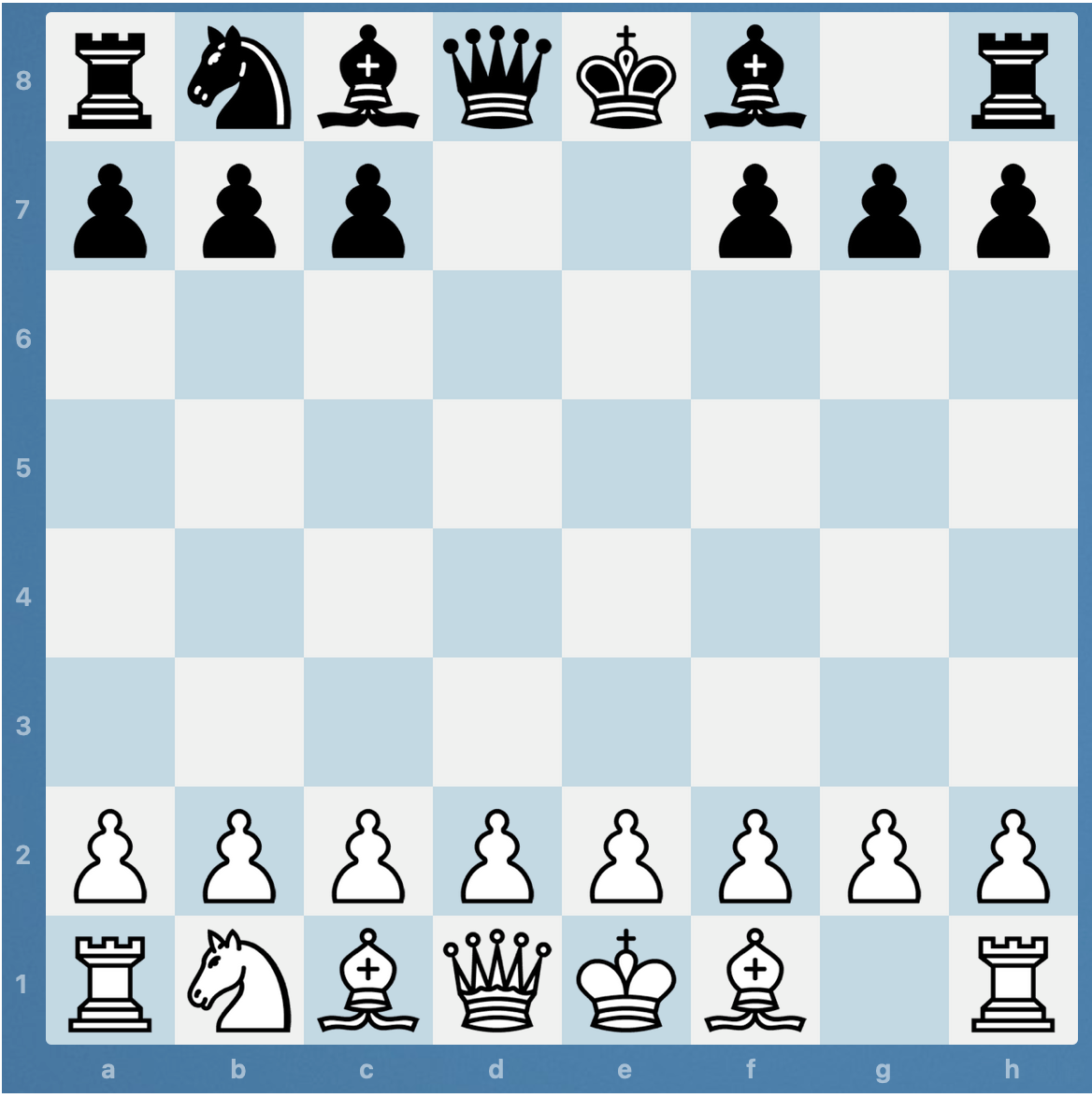In This Issue: From The Skittles Room January Under 2400 Games Analyzed, by GM Aleksandr Lenderman An Interview with Timur Turlov, by Vladimir Lionter World Rapid and Blitz Recap, by Matt Biancuzzo Chess Toons En Passant Problems, Problems, curated by Alexander George Editor's Note
Welcome back, fellow chess players, to this edition of the Marshall Chess Club's fortnightly bulletin, The Marshall Spectator.
We're excited to share our first member highlights of the year! Congratulations to each one of these members for their accomplishments in December, and keep an eye out for showcases of their accomplishments around the club. Good luck to everyone vying for a highlight in January!
Top USCF Rating Gain: Nathaniel Wyeth (492 USCF points gained) Most Active Member: William Ren (10 tournaments attended) Most Active New Member (joined in past year): Travis Henry-Reid (7 tournaments attended)
Curious to see where you stack up? You can see the full list here.
On Saturday, January 11, we had our very first Marshall Chess Academy Blitz Championship, which was well attended and featured live commentary on stream. Congratulations to this year’s big winners, pictured below left to right: Chenxuan Ling, Vladimir Bugayev (Board member and education committee member), Tanitoluwa Adewumi and Aditeya das.
We also were thrilled to launch the new season of our Marshall Chess Club Team Tournament, which features 8 teams of 3 battling it out for the title of top team and a plaque for the first place champions.
Last week, GM Andy Soltis visited our historic club to give a lecture about his forthcoming book, Deadline Grandmaster. If you were unable to attend the event, you can see it in its entirety here.
Looking ahead, we are excited to announce that IM John Donaldson will be giving an author talk and book signing at our historic club on January 28 during his visit to New York City.
The following Tuesday on February 4, we’re thrilled to announce another author talk and book signing by IM Silas Esben Lund on his book series dealing with 61 checkmate patterns and their origins.
Looking further ahead to the month of February, we also have a very special guest joining us for a Simul in celebration of Black History Month on February 24. GM Brewington Hardaway will come to our historic club to give a Simul and 20-minute Q&A at 6 pm. There will be pizza and refreshments served.
Further ahead on the calendar, we are excited to share with you that summer registrations are open for our summer camps here. In addition to GM Djurabek Khamrakulov, the summer camps will feature GMs Andrei Maksimenko, Alexander Shabalov, and Oliver Barbosa as instructors, with many other guests to be announced!
We look forward to sharing more details about the camps with you in the coming weeks, including discounts and changes to the camp schedule.
Looking back over the last two weeks, we have had a plethora of events for our members to play in.
The Friday Rapid on January 17 had 11 players registered and was won by CM Krish Bhandari who scored a perfect 4 out of 4 to win the $55 first place prize. Benito Kestelman and Arvie Lozano scored 3 out of 4 to win $20.63 each, while Jeffrey Ho, Guruprasad Katti, and Soma Gyergyades won $13.75 each for the performance in the rapid.
The Thursday Action on January 16 had 37 players registered and was won by Vladimir Bugayev and Joshua Block who scored a perfect 4 out of 4 to win $116 each, while Anthony Wang won a $70 class prize for his 3 out of 4 score. The following 4 players shared in the remaining prize funds winning $35 each for their 3 out of 4 score: IM Jay Bonin, Arvie Lozano, Moshe Uminer, and Alec Hyunmook Choi.
The ALTO Under 1700 on January 12 had 12 players registered and concluded with the following 4 players scoring 3 out of 4 to tie for first and win $30 each: John Bieda, Daniel Zahzouhi, Angel Astorga, and Yvette Fannell. Jeffrey Ho also won a $30 class prize for his 2 out of 4 performance.
The ALTO 1700+ on January 12 had 13 players registered and was won by IM Josiah Stearman who scored 3.5 out of 4 to win the $81 first place prize, while IM Jay Bonin and Jun Xiang scored 3 points to win $41 each.
The Rated Beginner Open on January 12 had 54 players registered and concluded with the following 6 players achieving a perfect 3 out of 3 score to win $101.33 each: Holden Wen, Dmitriy Povazhuk, Logan Shmulenson, Abeer Sethi, Sean Huang, and Dylan Alizadeh.
The Saturday Action on January 11 had 22 players registered and was won by GM Michael Rohde and Owen Qian, who scored 3.5 out of 4 to win $69 each. Michael Glick and Mark Glukhovskiy scored 3 out of 4 to win $42, while Scott Friedman and Jeffrey Ho won $21 each for their 2.5 out of 4 performance.
The Under 2000 Morning Action on January 11 had 39 players registered and was won by Sascha Mayers and Matthew Shirvell, who scored a perfect 3 out of 3 to win $171. The following 7 players won $21 each for their 2 out of 3 score: Jonathan Hsieh, Ajay Sreenivasan, Jacob Berner, Fionn Cavanagh, Samantha Edwards, Taekyum Kim and Kyle Xu.
The Morning Masters on January 11 had 6 players registered and concluded with 3 players scoring 2 out of 3 to tie for first and win $25 each: Sasha Schaefer, Jack Yang, and Daniel Yassky.
The Women & Girls on January 10 had a great turnout with 19 players registered, and was won by Arvie Lozano and WFM Nezihe Ezgi Menzi who scored 3 out of 3 to win $85.50 each.
The FIDE Blitz on January 10 had 68 players registered and was won by IM Nico Chasin who scored a perfect 9 out of 9 to win the $340 first place prize. IM Liam Putnam and IM Alexander Katz scored 7.5 out of 9 to win $127.50 each, while Shami Abdullayev won $86 for his 6 point score. WIM Chloe Gaw and Luc Hoffman scored 6.5 out of 9 to win $42.50 each, while Ian Nicholson and Anthony Wang scored 5.5 out of 9 to win $42.50 each.
The Thursday Action on January 9 had 42 players registered and was won by IM Kevin Wang, who scored a perfect 4 out of 4 to win the $154 first place prize, while Levon Tadevosyan and Sasha Schaefer scored 3.5 out of 4 to win $90 each. Joshua Block, Philip Uy, and Misha Raitzin scored 3 out of 4 to win $25.67 each, while Cameron Hull scored 2.5 to win $38.50.
We look forward to seeing you at the club soon!
Marshall January Under 2400 Games, Analyzed by GM Aleksandr Lenderman
Round 2: Marsh, James J - Cheung, Kyle
After a forfeit win in round 1, James Marsh had a very nice brisk win in round 2 where he played a very nice attacking game. You can play through the positions with annotations here.
1. d4 d5 2. c4 e6 3. Nc3 Be7 4. cxd5 exd5 5. Bf4 c6 6. e3 Bf5 7. Nge2 (7. g4 { Is another main line. ) 7... Nf6 (7... Nd7 Is the main line and probably stronger.)
8. Ng3 Bg6 9. h4 h5 10. Bd3 Bxd3 11. Qxd3 Na6 (11... g6 Was necessary to prevent Nf5. )
12. Nf5 g6 13. Nxe7 Qxe7 14. f3! Important move preparing 0-0-0 and e4 potentially, and preventing Black's counterplay.
14... Nc7 15. O-O-O Ne6 16. Be5 O-O-O
Turned out the king is also unsafe there. (16... O-O)
17. Kb1 (Preparing Rc1 Nb5 ) Rhe8 18. Rc1 Nc7 19. Nb5! Nxb5 20. Qxb5 Rd7 21. Rxc6+! bxc6 22. Qb8# Brilliant attacking game by James, getting him to a 2/2 start. 1-0
Round 4: Liao, Connor - Marsh, James J
After a round 3 bye, James is played a young player, Connor Liao, with both players are 2.5/3.
1. d4 Nf6 2. Nf3 g6 3. e3 Bg7 4. b3 c5 5. Bb2 cxd4 6. exd4 O-O 7. Be2 Nc6 8. O-O d5 9. a3 Qb6 10. Nc3 Rd8 11. Re1 Bg4 12. Na4 Qc7 13. h3 Bf5 14. Bd3 Bxd3 15. Qxd3 Rac8 16. Nc3 e6 17. Qe3 a6 18. Rac1 b5 19. Ne2 Rb8 20. Ng3 a5 21. c3 Ne8 22. Ne5 Nd6 23. Nd3 Qa7 24. Nc5 a4 25. b4 Nc4 26. Qe2 h5 27. Rc2 e5 28. dxe5 Bxe5
After a successful opening and early middle game, James got the upper hand with Black, which prompted Connor to unbalance the game, which, in my opinion, is a very interesting practical choice.
29. Nxh5!? gxh5 (29... Nxb2 Might be more accurate but can also be a bit complicated.)
30. Qxh5 Bg7 31. Bc1 N6e5?! (31... Re8 { Was more accurate.) 32. Rce2 Ng6?! (32... f6! 33. f4 Qf7! Was a strong defense which would preserve some advantage for black.)
33. f4 (33. Qg4!? With idea of h4 gave white full compensation for the piece.) 33…Qc7 34. f5?! White was in big time pressure, which made it hard for him to find the best options. (34. Qg4) 34…Nf4 35. Bxf4 Qxf4 36. Re7 Nd6! A very important consolidating move, which perhaps, White overlooked when playing f5.
37. Rf1 Qh6! Now, Black consolidates.
38. Qg4 Kh8 39. Nd7 Bf6 40. Nxf6 Qxf6 41. Qh5+ Kg8 42. Re3 Ne4 43. Rf4 Kf8 44. g4 Rb6 45. Rd3 Ke7 46. h4 Rh8 47. g5 Rxh5 48. gxf6+ Nxf6
The rest is a matter of simple technique as they say.
49. Kg2 Kd6 50. Kg3 Rc6 51. Kf3 Rc4 52. Kg3 Ke5 53. Re3+ Re4 54. Rfxe4+ dxe4 55. c4 bxc4 56. b5 Nd5 57. Re1 Rxf5 58. Kg4 Rf6 59. h5 Rb6 60. Kg5 f6+ 61. Kg6 Nf4+ 62. Kh6 Nxh5 63. Kxh5 Rxb5 64. Kg4 f5+ 65. Kg3 Rb3+ 66. Kf2 Rxa3 67. Kf1 Ra2 68. Rb1 a3 69. Rb5+ Kf4 70. Rb1 Rb2 71. Re1 a2 72. Kg1 Rb1 73. Kg2 Rxe1
A very important win for James with the black color, setting him up for a final round battle for first place against the leader of the tournament, Alan Morris-Suzuki, who had 4/4. 0-1
Round 5: Marsh, James J - Morris-Suzuki
Going into the last round, Alan Morris Suzuki had 4/4 and James was the only one with 3.5/4, meaning whoever wins the game, wins the tournament, while Alan would win the tournament with a draw with the black pieces.
1. d4 Nf6 2. c4 g6 3. g3 Bg7 4. Bg2 O-O 5. Nc3 d6 6. Nf3 c5 7. O-O Nc6 8. dxc5!?
This might look like a strange choice for a must-win game. However, very often, the approach of playing a symmetrical position for a small plus can be good in a must-win game, since defending a slightly inferior position can be quite an unpleasant task when you know you just need a draw to win the tournament, and feel like it's so close but yet, so far. (8. d5 Is a sharper line.)
8... dxc5 9. Be3 Nd7?! Seems like after this, White already gets a serious edge. (9... Be6) (9... Qa5 Are both main moves.) 10. Qc1!
A strong move, helping White build his harmony. 10…Nd4 11. Rd1 Nb6 (11... e5 Was lesser of the evil but also unpleasant since it gives up the d5 square.)
12. Nxd4! cxd4 13. Bxd4 Bxd4 14. e3 White goes for an exchange operation, where White will get a serious initiative, and Black has poor development poor coordination.
14... Bxe3 15. Qxe3 Qc716. c5 Tempting but perhaps the solid. 16. b3! Would be even more effective, as now, White has threats like c5 followed by Nd5, or Nb5, and Black cannot untangle here.)
16... Nc4 17. Qd4 (17. Qe4 Was a bit more accurate. 17... Be6 18. b4 Now, b7 is also being attacked, which is quite inconvenient for Black.)
17… Be6 18. Bd5 Ne5 Black is still worse but crawling back into the game a little bit. 19. Qe3! Bd7 (19... Nc4 Was perhaps, more resilient.) 20. b4 Bh3?! (20... e6) 21. Re1 Nc6 22. b5 Nb4 23. Bb3 Rad8 24. Qxe7 Rd7 25. Qh4!
Now, White wins material. 25…Nd3 26. Qxh3 Nxe1 27. Rxe1 Re7 28. Rxe7 Qxe7 29. Nd5 Qxc5 30. Qd7 Qc1+ 31. Kg2 Qe1 32. Nf6+ Kg7 33. Qd4 Kh6 34. Ng4+ Kh5 35. Nf6+ Kh6 36. Ng4+ Kh5 37. Qf4 g5 38. Bxf7+ Rxf7 39. Qxf7+ Kxg4 40. f3#
Flawless conversion by James and a brilliant tournament win. It was great to see James having a great bounceback event, after having a very difficult Marshall Championship. It showcased a very strong character by James and very good fighting spirit being able to win a last round game on demand against a master in a very convincing way. 1-0
GM Aleksandr Lenderman, Marshall Spectator Contributor
Timur Turlov on Hosting the FIDE Championship, Advancing Chess in
Kazakhstan, and Promoting School Chess Worldwide
In New York, the FIDE World Rapid and Blitz Championship recently
concluded, capturing headlines not just for its brilliant games but also for the
”jeans scandal” involving grandmaster Magnus Carlsen, who even garnered praise from Elon Musk. Amid this chess drama, we spoke with Timur Turlov, CEO of
Freedom Holding and an avid amateur chess player. Freedom Holding, the Kazakh
financial powerhouse, has been a consistent supporter of FIDE’s flagship events,
including this year’s championship in the heart of Manhattan. Our conversation
delved into the challenges of hosting a major chess event in New York, the
company’s vision for chess development, and Turlov’s personal connection to the
game.
Vladimir Lionter: Was it challenging to organize this championship in New York,
one of the most expensive cities in the world?
Timur Turlov: It was definitely challenging (laughs).
V.L.: Were there discussions about the event's location based on venue rental costs
and other expenses?
T.T.: Absolutely. We had extensive discussions within our team and with
contractors. We made a deliberate effort to avoid major compromises, even as we
encountered some unique negotiation dynamics with our partners. This
championship turned out to be the most demanding we’ve organized but also one of the most beautiful and certainly the largest and most spectacular chess events in the
past century of American chess. Despite exceeding our initial budget, the results
speak for themselves—a truly uncompromising success.
V.L.: What inspired you to sponsor FIDE, and what are your long-term goals with
this partnership?
T.T.: Partnering with FIDE, as the leading global chess authority, is crucial for us.
Our journey began with the development of the Kazakhstan Chess Federation, and
we understand that for chess players to grow, they need to face stronger opponents
and compete in international tournaments. Hosting more events in Kazakhstan is
vital. Additionally, chess resonates with a vast number of financiers, bankers,
politicians, and business leaders globally. This realization led us to two main
objectives: creating favorable conditions for chess development in Kazakhstan and
elevating chess as an undervalued sport. Unlike football or basketball, chess has
relatively modest funding despite its growing popularity. A recent U.S. survey
revealed that 20% of Americans play chess—an incredible figure that underscores
the game’s universal appeal. For me, chess is not just a passion but a crucial tool
for developing focus and critical thinking in our children—essential skills in a
world dominated by distractions.
V.L.: Freestyle chess is gaining traction due to its creativity and the integration of
AI, along with new sponsorship opportunities. How do you see FIDE adapting to
this trend to maintain the relevance of classical chess?
T.T.: Fischer Random Chess has been around for quite some time; it’s not entirely
new. I welcome the development of chess in all its forms. AI is already enhancing
the spectator experience, making tournaments more engaging. FIDE should
support any initiative that promotes the game.
V.L.: Speaking of engaging formats, have you considered supporting chessboxing?
T.T.: While we’re focused on our current projects, we’re always open to
collaborations. For instance, we’ve been supporting youth football development in
Kazakhstan. We even organized a football match in Astana featuring world chess
champions and top players. It’s about balancing focus with opportunity, and we’re
open to supporting initiatives from our colleagues.
V.L.: What strategies would you recommend to help FIDE position chess as a
global brand, attracting both elite players and a broader fan base?
T.T.: FIDE is already a global brand, the strongest in the chess world. All major
chess events are tied to FIDE. However, like any organization, it must evolve.
We’ve had discussions on potential improvements, and FIDE’s role as a unifying
force for the chess community remains essential.
V.L.: At 37, you’ve achieved so much. Could you be called the “Kazakh Elon
Musk,” and do you see yourself as a future FIDE president?
T.T.: (laughs) That’s quite a compliment! Elon is an extraordinary entrepreneur,
and while our paths and scales differ, I’d like to think I inspire others in
Kazakhstan, much like he does globally. Recently, I assumed leadership of the
International School Chess Federation, aiming to integrate chess into schools
worldwide.
V.L.: Where are school chess programs better developed—in the U.S. or
Kazakhstan?
T.T.: Definitely in Kazakhstan. Chess is part of the national curriculum. While the
U.S. has initiatives like “Chess in Schools,” they operate regionally, at the state,
city, or school level. Kazakhstan’s centralized approach simplifies the
implementation of national programs. However, we can learn a lot from the
diversity and innovation in the U.S., even as we build on our centralized model.
Through its partnership with FIDE, Freedom Holding Corp. exemplifies how
strategic sponsorships can elevate chess on a global scale. Speaking with Timur
Turlov revealed not only his deep admiration for the game but also his company’s
dedication to fostering chess’s development. By championing international
tournaments and promoting the sport’s value in education and intellectual growth,
Freedom Holding has reinforced chess’s relevance and accessibility. This
commitment ensures that chess continues to inspire players and enthusiasts
worldwide, paving the way for a brighter future for the sport.
Vladimir Lionter, Marshall Chess Club Member
World Rapid & Blitz 2024 Recap, by Matt Biancuzzo
Chess made a triumphant return to New York City to close the year. With an $8 million budget and a fancy Wall Street venue, the 2024 World Rapid and Blitz Championship promised a grand spectacle. What resulted was a chess soap opera that reminded us, once again, that the game’s biggest stories frequently are made off of the board.
Chess Thrives in New York
While the global chess epicenter may have shifted east in recent years, with countries like India and China driving its explosive growth, the World Rapid and Blitz proved one thing: New York City still holds a special place in the heart of the chess world.
Fans lined up outside the venue, braving long waits in cold temperatures for autographs and selfies with their favorite players. Iconic locations like Washington Square Park and the Chess Forum, landmarks for those in the chess-know, were buzzing with energy and anticipation despite the very December weather.
And then there was our Marshall Chess Club. Approximately 25 Marshall members competed in the championship, representing the club’s rich legacy in its home town. Among them were former world championship challenger Fabiano Caruana, back-to-back Marshall Club Champion Mykola Bortnyk, recent grandmaster-elect Brewington Hardaway, U.S. Women’s Champion Irina Krush, Megan Paragua, and blitz wildcard nominees Chenxuan Ling and Levi Kalani Fogo Esquivel.
The Marshall wasn’t just an afterthought—it became a hub of activity during the tournament. Sam Shankland, Wesley So, Carissa Yip, Sagar Shah from ChessBase India, and FIDE’s press team were among the notable names to stop by the club to participate in events and film content. In a particularly memorable twist, members were delightfully surprised to see Daniel Naroditsky and Oleksandr Bortnyk in the playing field for the club’s famed Friday Night Blitz Tournament after making quick draws in the final round of Day 2 of the World Rapid.
Drama and Dissent
It seems no top-level chess tournament is complete without drama, and the World Rapid and Blitz delivered in spades. The chaos surrounding the event, combined with player frustrations, painted a picture of a federation struggling to align its priorities.
FIDE’s decision to host the tournament in a glittering Wall Street skyscraper came with an $8 million price tag, but the execution left much to be desired. Despite the vast budget, fans were expected to cough up exorbitant sums for baseline entry into the venue - $200 for a day pass or $60 per round. VIP tickets ranged in the thousands.
Despite its opulence, the experience left much to be desired. Archaic security protocols were a notable gripe, with spectators filtered in and out at the start of every round to check their electronic devices. Journalists, unable to cover the games from the playing hall, were crammed into a small basement room with little access to the action.
And the prize fund—$1.5 million—felt underwhelming for an event of this magnitude and in comparison to the overall budget. “They were more concerned about playing where the money is,” one journalist said, echoing a common frustration.
The players, too, had their grievances, none more prominent than Magnus Carlsen. Dubbed “Jeansgate,” Carlsen was penalized during the rapid portion for wearing jeans, a violation of FIDE’s dress code. His response? An explicative lobbed at FIDE and a dramatic exit that left fans stunned. His protest echoed what many see as the federation’s misplaced focus on optics.
Magnus wasn’t the only player to cause a stir. On the heels of last year’s “knight dance” debacle with Ian Nepomniachtchi, Daniil Dubov once again blew his chances at a podium finish via protest. With entry to the knockout phase of the blitz on the line, Dubov forfeited his game against Hans Niemann, later claiming he had “overslept.” Hours later, he revealed his true reasoning: an unwillingness to play Niemann until the latter underwent a lie detector test regarding past cheating allegations.
Carlsen’s story didn’t end with his jeans. In an unprecedented return for the blitz portion, and denim clad from head to toe, he tied for first with Nepomniachtchi after a series of exhilarating games. FIDE conceded to a splitting of the World Blitz Champion title and of the tournament prize money between the two finalists. Carlsen and Nepomniachtchi joined Volodar Murzin, the World Rapid Champion, Koneru Humpy, the Women’s World Rapid Champion, and Ju Wenjun, the Women’s World Blitz Champion, as the top players at the event.
Reflections
The 2024 World Rapid and Blitz reminded us of an unrelenting truth: some of the best chess stories happen away from the board. While calls to make the game more exciting often focus on changing the rules or formats, the drama surrounding chess has proven endlessly fascinating in its own right.
In recent years, the chess world’s biggest headlines have come from the likes of The Queen’s Gambit, the Hans Niemann scandal, Magnus’s retirement from classical chess, and now Jeansgate and Dubov’s antics. These stories, messy and human, have made chess feel more alive than ever.
With all of the drama afoot, I couldn’t have been more reassured to see familiar faces from my own chess experiences, including those at the Marshall Chess Club, also present each day at the venue. Anthony Levin, News Lead at Chess.com, JJ Lang, Digital Editor at Chess Life, and Micah Jameson of Bushwick Chess were among those bringing their unique media perspectives to the event. Marshall team members Carlos Chavez, Sarathi Ray, and Miguel Garcia also showed up to lend their support, adding to the sense of community that made this event special.
The 2024 World Rapid and Blitz was a celebration of chess in all its forms. Buzzing parks, historic clubs, players from near and far, and passionate fans reminded us that while the epicenter of the game may shift, its heart remains in places like this.
Matt Biancuzzo, Marshall Chess Club Member
Chess Toons
En Passant
Ryan Rashid Mugdha, a nine-year-old chess prodigy from Bangladesh, has achieved the unimaginable by defeating five-time world champion and Norwegian grandmaster Magnus Carlsen in an online chess match.
On the morning of January 19, the FIDE Social Chess Commission launched its first event to celebrate 2025 as the Year of Social Chess. The World Social Chess Initiatives Marathon gathered coaches, scientists and NGO representatives who use chess in social inclusion projects to discuss their work and challenges. Spanning multiple countries and case examples, the participants of the conference shared their experiences, highlighting different perspectives on the role chess can play in social inclusion.
China’s Xue Haowen began the event without any Fide titles and ended it as a grandmaster, unbeaten on 7/9 and breaking Judit Polgar’s record as the youngest winner/
GM Gukesh Dommaraju has won his first game as world champion despite staring defeat in the face against GM Anish Giri in round one of the 2025 Tata Steel Chess Masters. Giri blundered last, while Gukesh's world championship helpers GMs Vincent Keymer and Pentala Harikrishna also won. Keymer escaped a lost position and then exploited a blunder by GM Leon Luke Mendonca, while Harikrishna played a perfect game to grind down GM Arjun Erigaisi in a position with two rooks for a queen.
Problems, Problems, curated by Alexander George
Géza Schweig, 1938
Position reached after Black's 4th move. How did the game go?
One more of these for those of you who have developed a taste for such shortest proof game problems!
---
Last issue’s puzzle: Ernest Clement Mortimer, 1991 (version by A. Frolkin)
This is the position after Black's 4th move. How did the game go?
Solution to Ernest Clement Mortimer, 1991: White must capture three black pieces in four moves with the missing white knight. The only game is 1. Nf3 e5 2. Nxe5 Ne7 3. Nxd7 Nec6 4. Nxb8 Nxb8. (The Black knight now on b8 originated on g8!)
---
Alexander George
Editor's Note
As always, if you have any feedback, comments, or would like to submit an article please contact us directly at td@marshallchessclub.org.
Enjoy, and thanks for reading!
The Marshall Chess Club
23 West Tenth Street New York, NY 10011
212.477.3716
Thanks for reading The Marshall Spectator! Subscribe for free to receive new posts and support the club.







